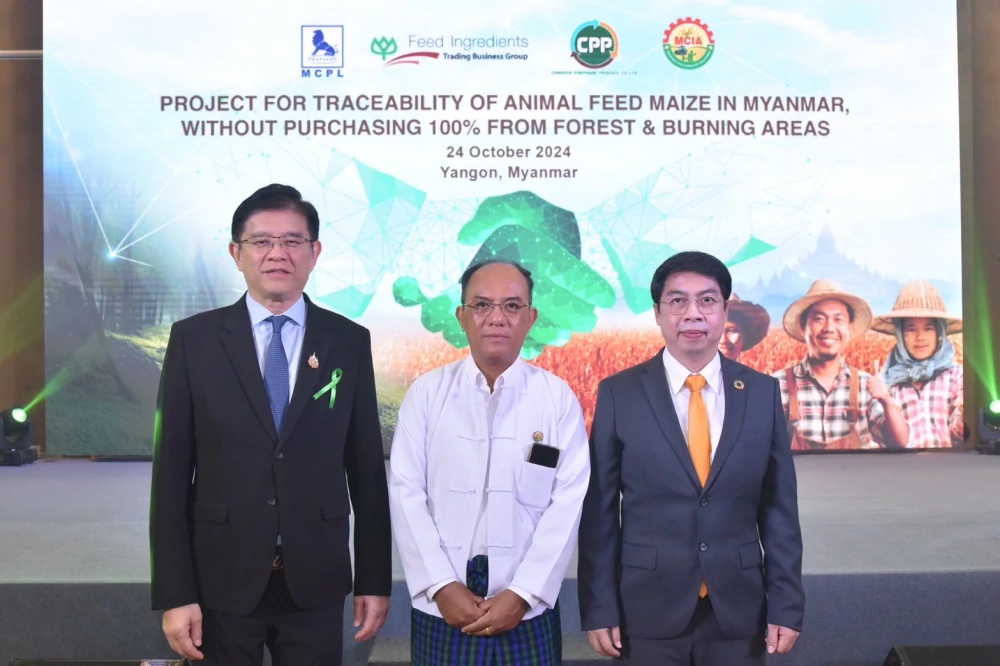Myanmar Corn Industrial Association Prepares to Empower Farmers and Corn Traders through CP Group’s Traceability System, Aiming to Enhance Sustainability, Increase Buyer Confidence, Reduce Cross-Border Haze, and Mitigate Harmful Effects on Health

Yangon, Myanmar - Mr. U Aye Chan Aung, Chairman of the Myanmar Corn Industrial Association (MCIA), has reiterated his commitment to leading Myanmar’s corn traders in adopting CP Group’s recently launched traceability system. His leadership further cements a momentous collaboration between the private and public sectors and will help garner the support and involvement of every farmer and operator in the industry.
MCIA recently announced its collaboration with Charoen Pokphand Produce Company Limited (CPP) and Bangkok Produce Public Company Limited (a CP Group subsidiary) on a joint project to enhance traceability in Myanmar of corn used as animal feed. This initiative is intended to bring greater sustainability and transparency to the supply chain, all the way from cultivation through to export. The adoption by its corn traders of this innovative technology is seen as a major step forward for sustainable development in Myanmar and the wider region, bringing tangible economic, social, and environmental benefits.
Mr. U Aye Chan Aung highlighted how crucial CP Group’s traceability system will be to building confidence in Myanmar’s corn industry, regarding product origin and general transparency. It will allow farmers and traders greater access to markets that demand high-quality raw materials produced through sustainable means. Moreover, by participating in this system farmers will benefit from the increased value of their produce that results from traceability and the confidence this brings to domestic and international buyers. This system will also improve production transparency, enabling farmers to adhere to sustainable farming practices and reinforcing long-term trust in Myanmar’s agricultural output.
The traceability system will give corn traders clear evidence of sustainable sourcing and produce untied in any way to deforestation or forest encroachment. The ability to provide such evidence is a prerequisite to accessing international markets governed by strict environmental standards. As well as enhancing product value, the system also reduces business risk by providing detailed traceability data for raw materials.
Mr. U Aye Chan Aung stressed the importance of utilizing technology to meet environmental challenges, including the prevention of deforestation and support for sustainable and eco-friendly farming practices. He noted how crucial this to local and global efforts to limit damage to the environment and to public health.
In the long term, the connection between private sectors, farmers, and operators through the traceability system will be a solid foundation for developing Myanmar’s sustainable corn industry. MCIA is committed to supporting and implementing this system throughout Myanmar, fostering strong collaboration from all sectors to enhance transparency and elevate the industry in the long run.
Dr. Pyo Ko Ko Naing, Managing Director of Alliance Eagles Group Limited and a board member of MCIA, expressed gratitude for the collaboration among the government, private sectors, and farmers in advancing the corn industry with the introduction of the traceability system. This initiative will enhance sustainability and transparency throughout the supply chain, from cultivation to export.
Dr. Pyo Ko Ko Naing noted that the MCIA was founded in 2019 to strengthen collaboration and support farmers, traders, exporters, and related industries within the country. The association has established regional associations across nine states and regions, including Mandalay, Southern Shan, and Kayin, to foster cooperation throughout the nation.
The association’s goals prioritize sustainable development in Myanmar’s corn industry, promoting collaboration between farmers and relevant entities, working with banks to support agricultural financing, and managing credit for farmers and traders.
Dr. Pyo Ko Ko Naing also pointed out the impact of cross-border haze pollution, affecting health and the environment in the region. MCIA supports the ASEAN Agreement on Transboundary Haze Pollution (AATH), aiming to collaborate with ASEAN member countries to prevent and control pollution from deforestation fires.
MCIA is also committed to fostering eco-friendly corn cultivation practices, focusing on preventing forest fires to protect public health and the environment, and raising industry standards.
Participation in MCIA’s traceability system not only benefits farmers, traders, and exporters but also effectively reduces health and environmental impacts. The association is determined to actively promote and support this project to ensure sustainability within the industry.




